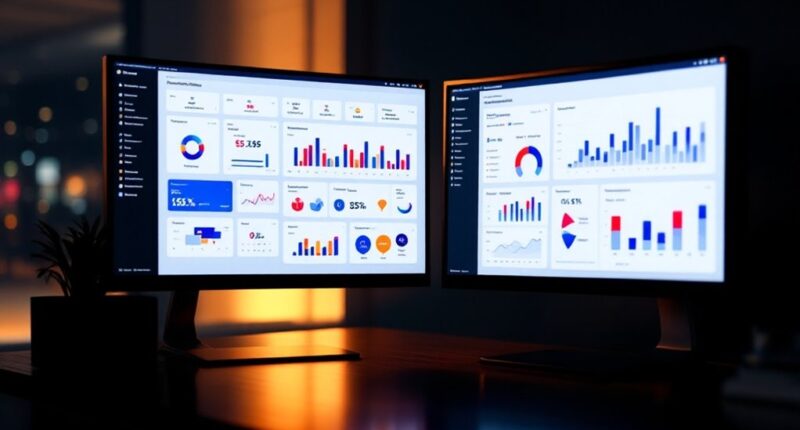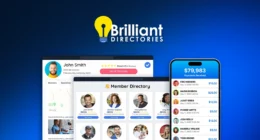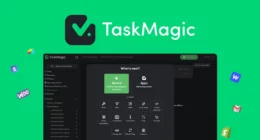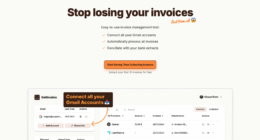Popular marketing automation platforms include HubSpot, Salesforce Pardot, and ActiveCampaign, which streamline business operations through CRM integration and email campaigns. These tools offer features like customer journey mapping, social media management, and multi-channel campaign coordination. Solutions range from Mailchimp’s user-friendly interface for small businesses to Klaviyo’s robust e-commerce capabilities. With ROI averaging $5.44 per dollar invested, these platforms demonstrate significant value for modern marketing teams.
Quick Overview
- HubSpot integrates CRM with automation workflows, offering comprehensive customer interaction tracking and personalized marketing campaigns.
- Salesforce Pardot provides enterprise-level automation with advanced analytics, starting at $1,250 monthly for 10,000 contacts.
- ActiveCampaign delivers intelligent automation features with budget-friendly pricing options from $29 to $149 monthly.
- Mailchimp offers user-friendly email marketing automation tools specifically designed for small business needs.
- Klaviyo specializes in e-commerce automation with strong CRM integration and detailed analytics for online retailers.
Essential Features of Popular Marketing Automation Platforms

While traversing the landscape of marketing automation software, businesses must understand the core features that make these platforms essential for modern marketing operations.
Leading marketing automation platforms combine customer relationship management (CRM) capabilities with sophisticated automation workflows to streamline email marketing efforts and lead nurturing processes.
Key platforms showcase distinct strengths in their feature sets. HubSpot integrates extensive CRM functionality for managing customer interactions, while Salesforce Pardot offers advanced analytics for data-driven decision making.
ActiveCampaign emphasizes personalized communication through intelligent automation, and Omnisend excels in omnichannel marketing automation across email, SMS, and push notifications.
Customer.io specializes in behavior-based messaging, allowing businesses to create targeted communications based on user actions and engagement patterns.
Effective marketing manager tools support comprehensive strategies through calendar organization and content management capabilities.
Email Marketing Automation Tools and Their Applications
How effectively businesses leverage email marketing often depends on choosing the right automation tools for their specific needs. Modern email marketing automation tools enhance campaign performance through features like personalized email campaigns, A/B testing, and thorough analytics. These platforms facilitate sophisticated drip campaigns while enabling precise customer segmentation based on various interactions and behaviors. SMS push notifications have become an integral feature of comprehensive platforms like Omnisend, expanding marketing reach beyond traditional email channels.
| Tool | Key Features | Best For |
|---|---|---|
| Mailchimp | User-friendly interface, Basic automation | Small businesses |
| ActiveCampaign | Complex drip campaigns, Advanced segmentation | Mid-sized companies |
| Klaviyo | Strong CRM integration, Detailed analytics | E-commerce |
| SendinBlue | Affordable pricing, Extensive testing | Growing startups |
Integration capabilities with CRM systems allow businesses to create highly targeted marketing strategies, while built-in analytics help optimize campaigns for better engagement and conversion rates.
Customer Journey Mapping Through Automation Software

Customer journey mapping software revolutionizes how businesses understand and interact with their customers across digital touchpoints. Through advanced marketing automation, companies can track and analyze customer interactions across multiple channels, creating detailed maps of the customer experience.
The software employs workflows and triggers to automate personalized marketing messages based on specific customer actions. When a shopper abandons their cart or completes a purchase, the system automatically sends relevant communications. These targeted campaigns guarantee that customers receive timely, meaningful content throughout their journey.
Data analysis from automation software reveals valuable insights about customer behavior and preferences. By identifying potential pain points and opportunities, businesses can optimize their customer retention strategies.
This systematic approach to mapping and responding to customer interactions helps companies deliver more effective, personalized experiences that drive long-term success. Popular platforms like EngageBay and HubSpot offer robust features for automating lead scoring and personalizing email campaigns.
Social Media and Multi-Channel Automation Solutions
Modern businesses leverage social media and multi-channel automation solutions to streamline their digital marketing efforts across multiple platforms simultaneously.
Tools like Hootsuite and Buffer enable marketers to manage social media content and track performance metrics from a single dashboard.
Modern social media management platforms consolidate content creation and analytics, empowering marketers to efficiently control their digital presence.
Multi-channel automation platforms enhance customer engagement by coordinating email campaigns, SMS messages, and social media posts with consistent messaging.
Solutions like Insider and Omnisend offer sophisticated marketing workflow options, allowing brands to create targeted campaigns across various channels. These platforms provide valuable insights through data analytics, helping companies refine their strategies based on audience response.
Content curation features, available in tools like CoSchedule, simplify the process of finding and sharing relevant content, ensuring brands maintain an active and meaningful presence across their digital channels.
Popular platforms like HubSpot and Mailchimp offer robust customer data integration capabilities to help businesses personalize interactions and deliver more targeted campaigns.
Pricing Models and ROI Analysis of Automation Tools

While businesses evaluate marketing automation platforms, understanding their pricing models and return on investment becomes essential for making informed decisions.
Leading platforms offer tiered pricing structures based on contact limits, with solutions like Salesforce Pardot starting at $1,250 monthly for 10,000 contacts, while ActiveCampaign provides more budget-friendly options from $29 to $149 monthly.
ROI analysis demonstrates compelling benefits of automation tools, showing $5.44 return for every dollar invested in email marketing automation.
Companies implementing segmented campaigns report significant improvements in lead conversion rates and customer retention, with an 80% increase in conversion success.
Additionally, these tools deliver measurable time savings, boosting sales productivity by 14.5% through streamlined processes.
This data helps businesses justify their investment in marketing automation while scaling their operations efficiently.
Email campaign management features in popular platforms like Mailchimp offer comprehensive automation capabilities that enhance overall marketing effectiveness.
Frequently Asked Questions
What Is a Marketing Automation Software?
Marketing automation software is a specialized digital tool that helps businesses streamline and automate their marketing activities.
It handles repetitive tasks like sending emails, posting on social media, and managing customer data automatically.
The software can segment audiences, deliver personalized content, track customer behavior, and analyze campaign performance.
Which Is the Best Marketing Automation Software?
The “best” marketing automation software depends on specific business needs and resources.
For small businesses with limited budgets, ActiveCampaign offers an excellent balance of features and affordability at $29-$149 monthly.
Larger enterprises might benefit more from HubSpot Marketing Hub’s extensive CRM integration or Salesforce Pardot’s robust B2B capabilities.
For e-commerce businesses focusing on omnichannel marketing, Omnisend provides strong multi-channel automation features starting at $16 monthly.
Is Canva a Marketing Automation Tool?
No, Canva is not a marketing automation tool.
While it’s an excellent platform for creating visual marketing content, it lacks core marketing automation features like email campaign management, lead tracking, and automated customer journeys.
Canva’s primary function is graphic design, allowing users to create social media posts, presentations, and marketing materials.
For true marketing automation, businesses should use dedicated platforms like HubSpot or Mailchimp, though Canva can complement these tools through integrations.
Is Mailchimp a Marketing Automation Tool?
While originally launched as an email marketing service in 2001, Mailchimp has evolved into a robust marketing automation tool.
Studies show that automated emails generate 320% more revenue than non-automated ones, making Mailchimp’s automation features particularly valuable.
The platform now offers extensive automation capabilities, including triggered email sequences, behavior-based campaigns, and customer journey mapping.
Its integration with e-commerce platforms and built-in A/B testing features further cement its position as a legitimate marketing automation solution.
Conclusion
Marketing automation platforms shine like lighthouses guiding businesses through the fog of digital complexity. From email campaigns that flow like well-orchestrated symphonies to social media posts that dance across platforms with perfect timing, these tools transform chaotic marketing efforts into streamlined success stories. As technology evolves, companies that embrace these powerful solutions will navigate the future of digital marketing with confidence and precision, staying ahead in an ever-changing marketplace.








